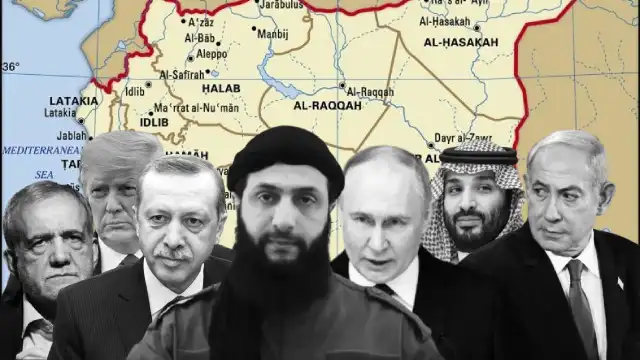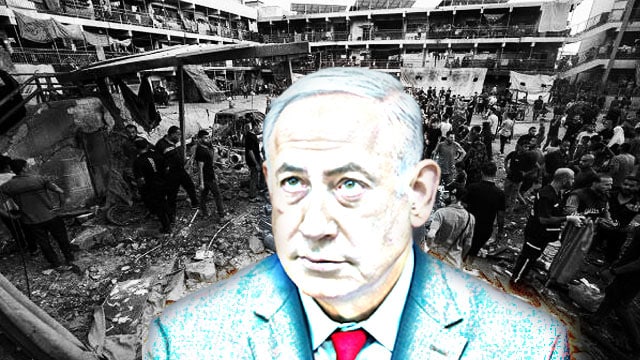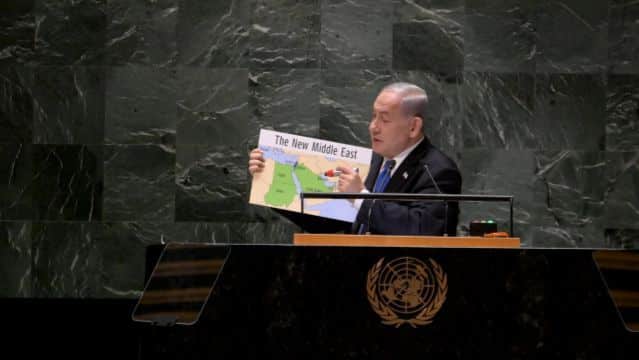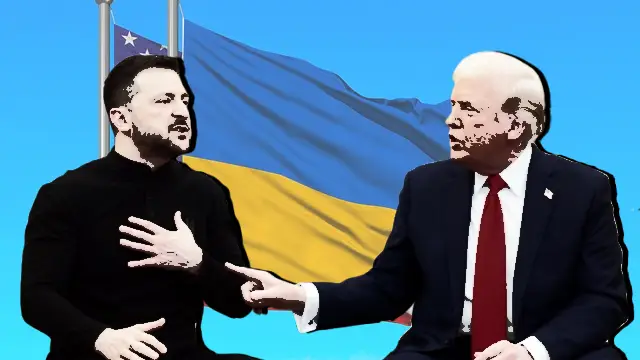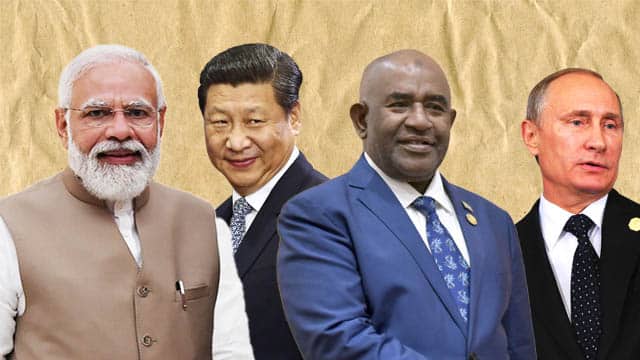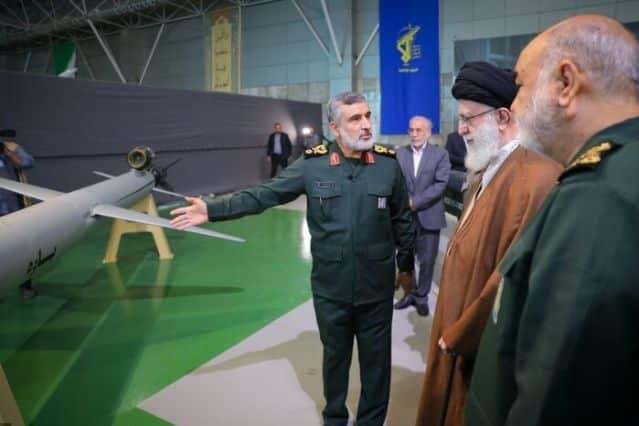Since Dr Bashar al-Assad-led Ba’ath Socialist Party’s government collapsed in December 2024, Syria’s geopolitical landscape has been experiencing drastic changes. What’s happening in Syria now is a plethora of overt and covert battles—between friends and foes—over the control of Syrian resources and territory.
There is an ongoing struggle among Russia, the US-backed Israel, Recep Tayyip Erdoğan’s Turkey, Saudi Arabia-led Gulf monarchies, and the European NATO bloc over Syria.
Over the last few months, amid genocides of Alawite Muslims and Christians in the restive coastal provinces of Latakia and Tartous, Syria’s defacto leader Ahmed Hussein al-Sharaa, aka Abu Mohammad al-Jolani, and his West-backed Islamist organisation Hay’at Tahrir al-Sham (HTS), which is an al-Qaeda offshoot, cemented ties with several power blocs to consolidate their rule.
The West’s mainstream media mostly concealed what’s happening in Syria even when the HTS terrorists have been killing civilians en masse, Israeli aggression continues unabated in the country and people from minority sects called upon Russia and foreign powers to save them.
In this complex scenario, what’s happening in Syria can be summed up as a great power game, and each party has a lot to lose or gain, leading to quite unlikely alliances.
West vs Russia
For the West, toppling Dr Assad was not only a victory against Iran and its “Axis of Resistance” but also against Russia, which had been supporting the Ba’ath government for a long time.
One of the underlying reasons behind the North Atlantic Treaty Organization (NATO) bloc’s support to an Islamist terrorist organisation like the HTS was that Brussels and Washington DC, under Joe Biden, wanted Russia to get entangled in Syria so that its offensive against Ukraine weakens.
However, that didn’t happen.
What’s happening in Syria shows that Russian intervention has remained next to nil, as Moscow didn’t want to give up its certain victory in Ukraine to save a protege who has lost popularity.
This is why Russia and its partner Iran remained nonchalant when Dr Assad’s government collapsed.
Yet, by not supporting Dr Assad at a crucial hour, Russia secured its presence in Latakia, where it has an airbase, under the new regime.
Amid the genocide, Russia, according to its Ministry of Foreign Affairs, housed over 9,000 Syrians fleeing the HTS’s slaughtering campaign in the coastal regions.
The HTS’s inability to harm the Syrians who took refuge in Latakia’s Russian Airbase exhibits Moscow’s clout in post-Assad Syria.
Although there has been a massive demand for Russian intervention in Syria, especially from the Alawite Muslims and Christians, Moscow has avoided any involvement in Syria.
Russian steps, experts believe, are carefully planned, focusing on the Ukrainian front, where Moscow is closer to victory than ever.
Since Donald Trump returned to the White House in January 2025, he has scrapped the Biden-era policy of sponsoring Ukraine to fight Russia.
Mr Trump’s emphasis on reaching a ceasefire between Russians and Ukrainians by Easter has sealed the fate of Kiev, despite the Europeans riling up.
Yet, Russia is hitting the Ukrainian troops hard, forcing them to retreat across the front.
It’s estimated that before celebrating the 80th anniversary of the Victory Day of the Great Patriotic War (Second World War) on May 9th 2025, Russian President Vladimir Putin may force Ukraine’s defeated leader Volodymyr Zelenskyy to sign a ceasefire deal drafted on Moscow’s condition.
If it’s not done, then the war may prolong, as the European NATO powers can continue to fund Mr Zelenskyy.
In this scenario, it’s against Russia’s interests to intervene directly in Syria.
Talking to the East Post, Oleg Glasunov, an associate professor of the Department of Political Analysis at the Plekhanov Russian University of Economics, emphasised Moscow must win a victory against Ukraine first to intervene in any other country.
“Russia, until it intervenes in the conflict, must first end the war in Ukraine. Moscow will take a cautious position and look for allies in this situation,” Mr Glasunov told the East Post.
In the Syrian context, Mr Glasunov believes Russia and Iran have committed the mistake of not replacing Dr Assad with a powerful authoritative figure.
He told the East Post that it’s something the US does—it replaces a protege whenever it finds them losing popularity to ensure that they don’t “lose control of the country”.
Discussing the West’s scheme against Russia in Syria, Mr Glasunov said, “The US and the EU have always opposed the strengthening of Russia’s influence in the Middle East. They will support and provide military-technical and economic assistance to the new leadership of Syria.”
“It is important for them that the Middle East becomes a zone of constant military conflicts, so as not to let China and the Russian Federation enter this region,” he added.
He estimates that the US and the EU will continue to support Turkey, “which is also dissatisfied with the presence of Russia in this region.”
Can Russia thwart West’s consolidation in restive Syria?
But can the Russians thwart the West’s attempt to re-colonise Syria?
Mr Glasunov believes Russia won’t intervene alone in Syria even if it wins in Ukraine.
“Russia will not intervene alone in Syria’s essentially incipient civil war. To do this, she needs to find and enlist the support of allies in the countries of the Middle East,” he told the East Post.
According to Mr Glasunov, there can be several unlikely alliances that Russia can enter into to prevent the West from using the HTS-led Islamists to consolidate their grip on Syria.
“The most likely allies of Moscow in this situation are Israel (for it, radical Islam in Syria is a threat), Saudi Arabia (against the strengthening of Turkey in the region),” Mr Glasunov estimated.
Even though Israel, Saudi, Turkey and other Gulf monarchies aided terrorists against Dr Assad’s government, these powers have their internal strifes over stakes in Syria.
While Israel wants to expand its territory by annexing more Syrian land, Turkey wants to ensure that Syria is balkanised and the Kurd rebellion is exterminated.
However, Saudi Arabia would like to retain its influence on the Sunni Islamists ruling the country rather than pushing them towards Mr Erdoğan’s Turkey.
Even if Russia joins hands with any of these powers, including Israel, Moscow has to ensure there is an alternative political force it’s supporting against the HTS.
The Ba’ath Socialist Party has been liquidated.
Russia can’t erect a new political bloc without the help of Iran, its only genuine ally in the region.
However, Iran, which faces imminent American aggression, has been busy conducting indirect talks with the US in Oman to de-escalate the situation.
For Tehran, with a moderate Dr Masoud Pezeshkian at the helm and an ailing octagenarian Supreme Leader Ali Hosseini Khamenei losing his grip, promoting the decimated “Axis of Resistance” is an unproductive business.
Highlighting the lack of options, Mr Glasunov says, “Who to support? We need a new leader who is authoritative and able to rally all the opponents of the Hayat Tahrir al-Sham group in Syria! And he must take a pro-Russian position. Otherwise, there is no point in interfering in the conflict.”
Finding such a figure in Syria is not very easy in the present scenario when the HTS has banished all opposition forces.
The erstwhile tallest figure Dr Assad’s lost popularity precludes his return from Moscow, where he sought asylum.
Thus, Russia must create a political bloc that will fight for Syria’s independence and sovereignty and take a pro-Russia position, which goes against the overwhelming pro-West and pro-Turkey position of the HTS and other Islamists.
Still, Mr Glasunov believes that a conflict with Russia is inevitable as Mr Jolani’s regime would work in favour of the US and the EU.
“The new Syrian leadership is more focused on the EU, the United States and Turkey. Therefore, a conflict with Russia is inevitable. But so far the leaders of the HTS are not ready to speak openly against the Russian Federation. They don’t have enough power to do that,” Mr Glasunov said.
“But, if Russia emerges victorious from the war in Ukraine, then the situation may change 180 degrees. Moreover, not only in Syria but also in the Middle East,” he added.
With regional powers traditionally gravitating toward strength—explaining their historic American alignment—Russian victory could dramatically shift regional dynamics, potentially tilting Syria toward Moscow.
Turkish ambitions
Turkey under Mr Erdoğan’s far-right Justice and Peace Party’s (AKP) rule has aided the Islamist forces against Dr Assad, despite signing a free trade agreement with the Ba’ath Socialist Party’s government and lifting visas between the two countries.
“From the very beginning of the chaos in Syria, AKP got involved in it through Islamist groups. They supported these groups, which were trying to oust the Assad government. And they did this overtly, without trying to hide the essence of their policy,” Murat Akad, a leader of the Turkish Communist Party (TKP), told the East Post.
“The AKP leaders even went so far as to say that they would reach Damascus in three days and pray in the big historical mosque in the city. For a period this policy seemed to have a positive result for the government and they gained ground in northern Syria,” Mr Akad added.
While the HTS and other Islamist factions received support from Turkey, Mr Erdoğan had to fight the Islamic State terrorists on behalf of NATO and also the anti-Assad Syrian Democratic Forces (SDF), linked to the Kurdish militants who want to carve out a free Kurdistan.
“But then the Assad government started receiving help from Russia, but more importantly the Syrian people resisted in a very determined way. As a result, AKP’s policy did not have the outcome they had hoped for. But since then, they retained the provinces in northern Syria. These provinces became a stronghold for the radical Islamist groups,” Mr Akad said, highlighting the bigger role that the AKP played when the HTS resumed its attacks in December 2024.
“When the latest wave of attacks by the radical Islamists started, they started from the province of Idlib, which was among these provinces. Again, AKP overtly expressed its sympathy for these Islamist organisations. Having found a new opportunity, expansionist aspirations were revived,” he told the East Post.
Mr Erdoğan’s government suffered a setback when the HTS regime signed a treaty with the SDF to unite Syria’s provinces, which are divided among different warring groups.
For Turkey, the SDF gaining a foothold in Syria is a major geopolitical challenge.
So, Turkey needs to have control over what’s happening in Syria. However, that’s not possible because Turkey isn’t the only country controlling Damascus.
“It’s not only the AKP government, who is involved in the regime change in Syria. The UK, the US, Israel and, to a lesser extent, other imperialist countries are also involved. Russia’s presence in Syria is also continuing. All of these powers try to have the upper hand in the new correlation of forces, and the AKP government is trying to implement its expansionist policies in this regard,” Mr Akad underscored.
Despite sharing cordial relations with Israel, and maintaining trade and commerce ties, Mr Erdoğan’s government is viewed with suspicion by Tel Aviv.
For Israel, Turkish ambitions of resurrecting the Ottoman Empire is a challenge to its regional hegemonic quest.
“As AKP’s neo-Ottomanist aspirations developed, they started preferring to have better relations with Arab governments and reduce the ties with Israel. This corresponded with the Arab Spring and the AKP government started highlighting Israeli oppression of the Palestinian people. But this did not deter the government from continuing and even strengthening the economic ties with this country,” Mr Akad said.
Still, for Israel, it’s crucial to have a stronger grip over what’s happening in Syria and consolidate its positions on the occupied territories.
To do so, it can support Russia.
However, it’s likelier that Tel Aviv would support Saudi Arabia, as Riyadh’s proteges won’t challenge Israeli occupation of Syrian territories.
Moreover, the Saudis will ensure that Iran’s “Axis of Resistance” isn’t resurrected in Syria to further trouble Israel.
This can’t happen if a Russia-backed bloc comes to power given Moscow’s strong Iranian ties.
What’s happening in Syria is its Balkanisation
With multiple parties at stake, there is a good chance that there will be further conflicts to unify Syria under a single command, which Mr Jolani is unlikely to do. What seems possible given what’s now happening in Syria, it seems that the country may head towards a total Balkanisation.
What’s happening in Syria right now is its Balkanisation as weakened by internal turbulences, its involvement in genocides and nationwide anti-incumbency sentiments, the HTS can’t fight for national unity and integration of Syria.
Moreover, the minority sects are apprehensive about their safety under the HTS and would prefer to stay away from its rule.
Other Islamist groups would continue their terrorist activities to establish an extremist theocracy.
As Israeli bombing has destroyed Syria’s crucial military hardware and weapon systems, it’s unlikely that Mr Jolani can even fight those powers seeking Syria’s Balkanisation.
Eventually, Mr Jolani’s weakness can lead to his government’s collapse.
However, with Russia’s victory in Ukraine, the situation can change. In case Russia and Iran jointly erect an opposition, then the regional powers won’t be able to oppose it. Israel won’t be able to attack it either fearing Russian reprisals.
With Russia winning the Ukraine war, it won’t be feasible for the regional powers to oppose it. Also, Russia will not leave any stone unturned to protect its long-term strategic interests in Syria.
A new series of conflicts and power struggles could further transform Syria within years. Whether this brings a better or worse future for Syrians, only time will tell.

